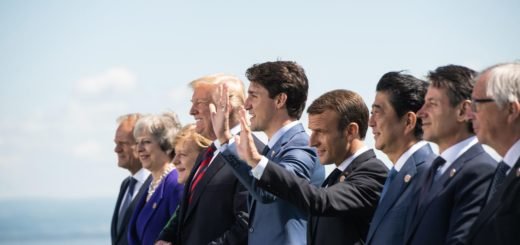USI Annual UN Forum 2023: International Humanitarian Law and Peace Operations
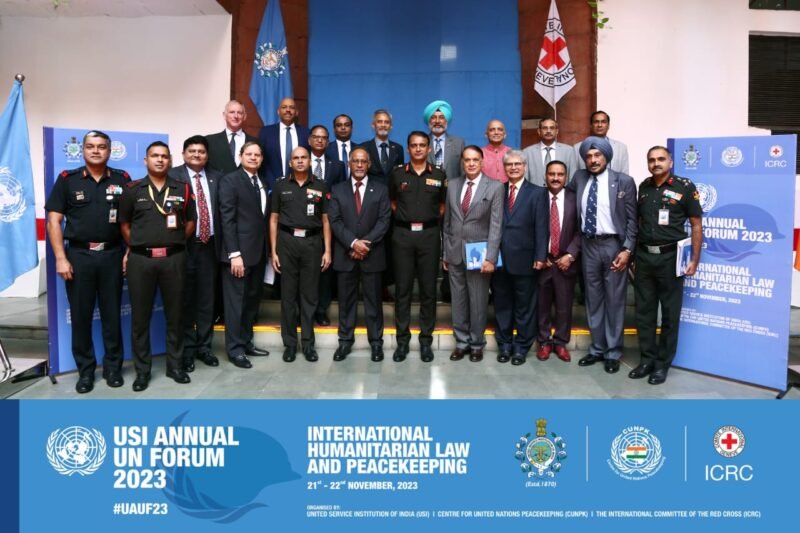
The United Service Institution of India (USI) organized its annual UN Forum 2023 on November 21-22 in New Delhi. The seminar on “International Humanitarian Law and Peacekeeping” was conducted in collaboration with the International Committee of the Red Cross (ICRC) and the Center for UN Peacekeeping (CUNPK).
Day 1
Opening Session
In the backdrop of the highly contemporary and contested environment, Maj Gen PK Goswami (Retd), Deputy Director General USI in his welcome address highlighted the need for humanitarian law against the prevailing geopolitical churning today, the world is witnessing growing geopolitical tensions and armed conflict thus triggering the humanitarian crisis, the current situation reinforces the essence and relevance of International Humanitarian Law (IHL) in the preserving our common humanity.
Opening the event, Maj Gen BK Sharma (Retd), Director General USI, stated the seminar would facilitate knowledge sharing on applying IHL principles between practitioners and experts to address real-world peacekeeping challenges.
In a recorded message, Jean-Pierre Lacroix, Under-Secretary-General for Peace Operations, praised the Government of India, the Indian Army, the International Committee of the Red Cross, and the United Service Institution of India in a video message for initiating discussions on pressing issues related to protecting civilians in conflict settings. He observed that the ongoing crises serve as a stark reminder of the disproportional impacts of conflict on vulnerable civilian populations, highlighting the need to uphold international human rights and humanitarian law principles.
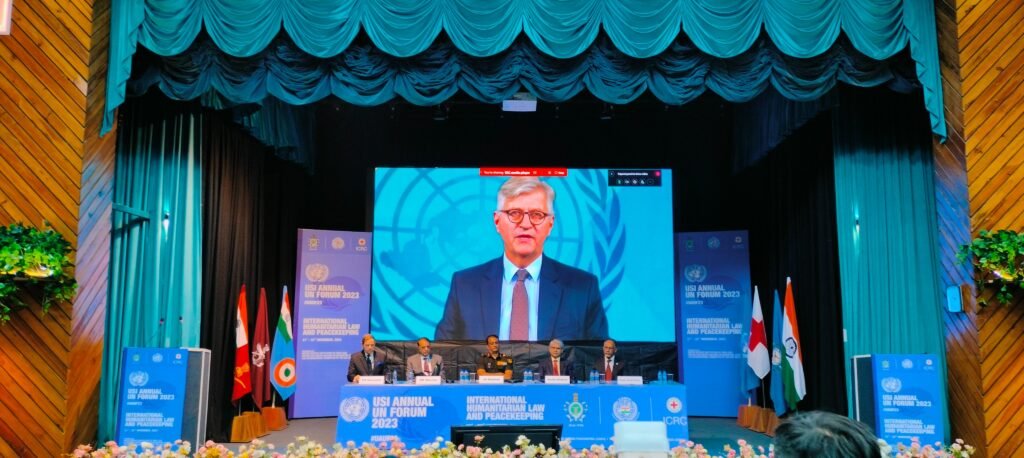
Lacroix noted that next year marks 25 years since the UNSC added civilian protection in armed conflicts to its agenda. Since then, safeguarding civilians has remained a core goal of UN peacekeeping missions operating in extremely difficult environments frequently marked by deliberate attacks. Looking ahead, he emphasized peacekeeping’s instrumental capacity-building role in host nations guided by humanitarian principles as well as efforts within the Department of Peace Operations to improve accountability and prevent harm to civilians from peacekeeper misconduct.
In the Keynote Address, Lt Gen JP Mathew, Chief of Integrated Defence Staff, IHQ MoD, emphasized that IHL’s primary aim is to limit armed conflict impact and protect civilians and combatants. However, complexities arise for peacekeepers due to the involvement of non-state actors and blurred lines between civilians and combatants, especially in urban warfare.
Ambassador Asoke Mukerji, India’s former Permanent Representative to the United Nations, reiterated that India is among the founding members of the United Nations who helped create the framework of IHL. India was one of three co-sponsors of the 1948 General Assembly motion to negotiate the Genocide Convention, which was adopted on 09 December with participation from the Indian Ministry of Defence.
He deliberated on how the United Nations responds to allegations of violations of international humanitarian law, noting that pen-holding capacities within the UN Charter do not formally exist. Instead, great power politics de facto determines outcomes today.
Amb Mukerji also emphasized the role of women peacekeepers, giving due credit to Hansa Mehta for her instrumental role in introducing gender equality into Article 1 of the Universal Declaration of Human Rights.
Mr Kedir Awol Omar, Head of the ICRC Regional Delegation, emphasized that UN peacekeeping operations remain vital for safeguarding peace given increasingly complex mandates focused on the rule of law.
He highlighted the ICRC’s commitment to constructive dialogues with the UN on operational, protection, legal and training issues related to peacekeeping. The ICRC also stands ready to engage with member states and troop contributors in discussions on these crucial issues, including on ensuring respect for international humanitarian law through promoting compliance among conflicting parties.
Session 1 – International Humanitarian Law and Law of Armed Conflict
The first session chaired by Dr George Dvaladze, Regional Legal Advisor for South Asia, ICRC, New Delhi, focused on the applicability of IHL to UN peacekeeping operations. Speakers concurred that while the UN is not party to the Geneva Conventions, customary international law binds the UN’s objectives of maintaining peace and security and preventing war. However, implementing IHL poses challenges due to the involvement of non-state actors and sexual violence by certain peacekeeping units.
Wg Cdr (Dr) UC Jha (Retd) elucidated current peacekeeping comprises 87,000 personnel across 12 missions – the 5 largest being MINUSCA, UNMISS, MONUSCO, MINUSMA and UNIFIL. Initially, the applicability of IHL to peacekeepers was debated as IHL primarily covers states, while peacekeepers aren’t combatants. However, when peacekeepers use force, IHL norms apply. For effective application, pre-deployment IHL training for contingents is paramount.
Lt Gen S Tinaikar (Retd), Former Force Commander, South Sudan, emphasized peacekeepers must adhere to IHL principles around distinction, proportionality and necessity while utilizing force under Protection of Civilian mandates. Consensus building within the Security Council around robust peacekeeping mandates faces obstacles when the strategic interests of member states collide.
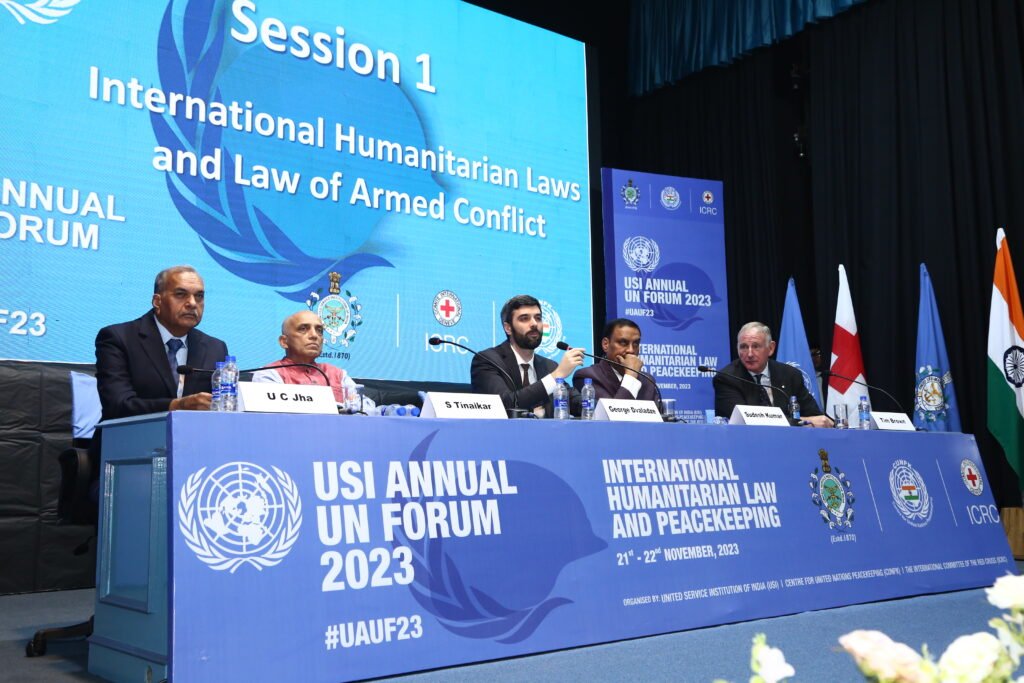
From a police lens, Mr Sudesh Kumar, IPS (Retd), Former Police Commissioner in MONUSCO, advocated for capacity building of judicial institutions to address IHL violations through dedicated training on investigation, and prosecution. Community outreach also promotes awareness, especially among vulnerable groups. Early warning systems involving locals help monitor potential violations. Overall, the involvement of neutral peacekeeping forces minimizes casualties when compared to direct national military action.
Mr Tim Brown, FASCo, ICRC highlighted ICRC’s engagement in building the expertise of peacekeeping personnel around rights protection. As first responders to conflict zones, supplementary training helps peacekeepers effectively handle complex situations like sexual violence.
The session spotlighted the importance of dynamic IHL education across peacekeeping machinery – from troop contributors and commanders to humanitarian actors like ICRC – for responsible and ethical operations.
Session 2 – Protection of Civilians and International Humanitarian Law
The session was virtually addressed by Mr David Haeri, Director of Policy, Evaluation and Training at UN DPO, who situated Protection of Civilians (POC) mandates within applicable international law frameworks including IHL, International Human Rights law and International Refugee law. He outlined a 3-tiered approach involving dialogue, physical protection and fostering a protective environment. Peacekeepers must uphold IHL principles and mitigate harm. However, conflicts are becoming more asymmetric, urban and climate-affected, hampering POC.
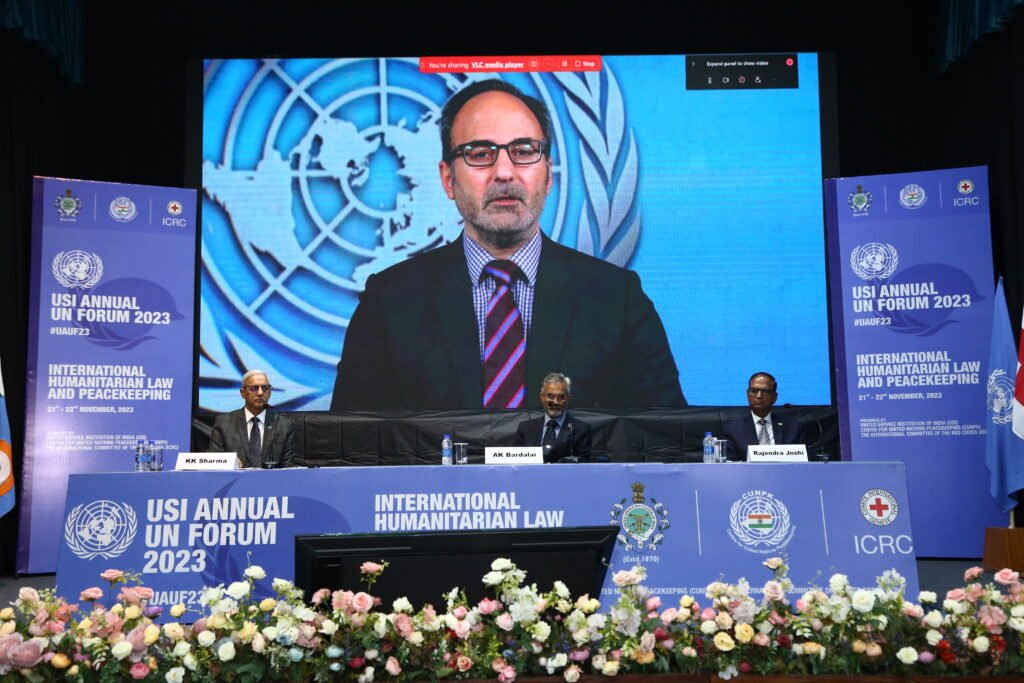
Col (Dr) KK Sharma (Retd), examined distinctions between civil wars and intra-state conflicts, using examples of South Sudan and DRC. He outlined 3 pillars of the Responsibility to Protect (R2P) doctrine – the state’s responsibility to protect citizens from atrocities, assist other states, and take collective action under the UN charter in cases of manifest failure. However, outside intervention can sometimes worsen conflicts.
Lt Gen S Mohan, Force Commander, UNMISS, enumerated obstacles to POC in conflict zones like resource constraints, limitations in gathering actionable intelligence, inconsistent peacekeeping mandates and coordination challenges with multiple stakeholders. Still, POC achievements in parts of South Sudan showcase the commitment of peacekeepers despite difficulties. Unconventional personal risks like flood protection also safeguard civilians.
Mr Rajendra Joshi, IPS (Retd), Former Chief Security Advisor in the UN, traced the evolution of peacekeeping noting the lack of tailored pre-deployment training on niche skills like language or driving until recently. Restructuring and building capacities of host police, proactive civil outreach, specialist recruitment and emphasizing personnel safety are vital learnings.
Session chair Maj Gen (Dr) AK Bardalai (Retd), Former Deputy HoM and Deputy Force Commander, UNIFIL, remarked peacekeeping law provides legal authority but can be ambiguous. Tactical context-driven judgements on using force often save lives. Though controversial, inaction too constitutes a decision. Beyond rules, moral obligations shape decisions impacting civilians.
The session offered perspectives from field commanders, police and legal viewpoints on limitations around implementing POC amidst the increasing volatility of conflict zones and violence against civilians.
Day 2
Day 2 (22 Nov 23) of the USI Annual UN Forum started with an Opening address by Lt Gen Rakesh Kapoor, DCOAS (IS & C), Army HQ. He highlighted key aspects of protecting the peacekeepers and the role of women in UN peacekeeping missions. He underscored the changing landscape of the mission areas as new technology creates new challenges, sometimes also perpetuating disinformation that hampers the security of the peacekeepers. He elaborated on the importance of having more clarity on the subject of malicious acts against peacekeepers. Further, he emphasised the need to be abreast with new technologies as and when they come about in order to be better prepared.
In his opening remarks, Mr Shombi Sharp, UN Resident Coordinator in India, said in a world of great turmoil and conflicts, the only path back to peace is IHL. He underlined that IHL is particularly critical now when the respect for human rights is floundering in the ongoing conflicts. But there is a silver lining in the fact that all the 194 countries in the world are still legally bound by the rules of IHL in an exemplary recognition of the fact that even wars have rules. As the year 2023 marks two important landmarks: the 160th year of the ICRC and the 75th year of the IDHR, Mr Sharp highlighted the role that India has played in the peacekeeping operations including sending an all-women contingent in 2007 in Liberia, the first of its kind. He highlighted the necessity of having more women in the mission areas, and the need to bridge gender inequality and the UNSC Res 1325 highlights the disproportionate sufferings of women in conflicts.
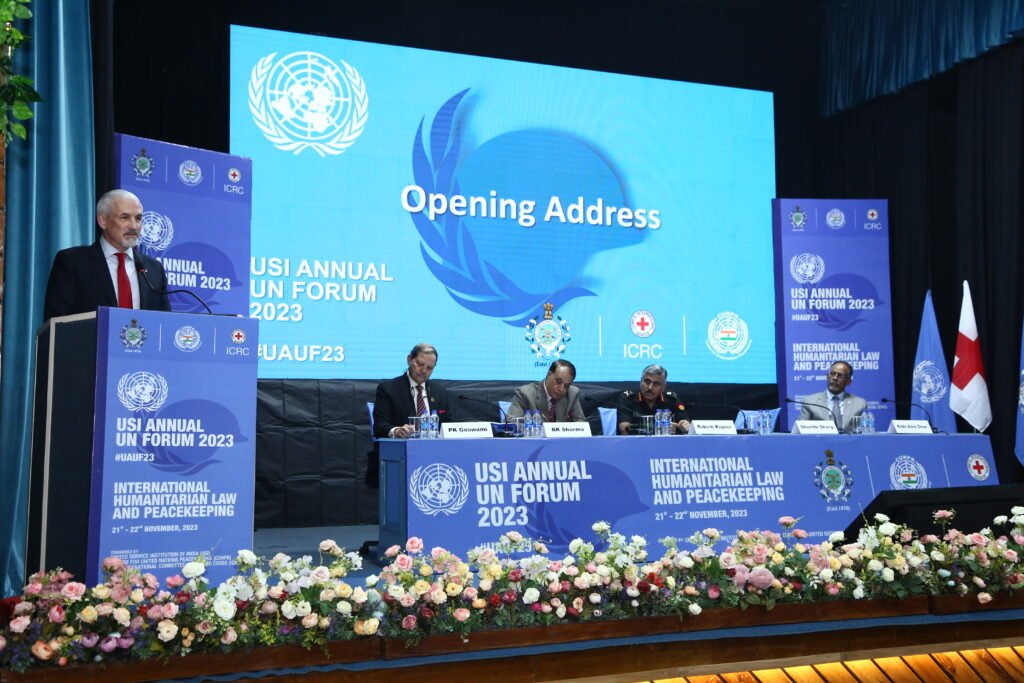
Image credits: USI
Session 3 – Protecting the Protectors: Accountability for Crimes Against Peacekeepers
The session began with Maj Gen PK Goswami (Retd), Deputy Director General, USI, noting the significant toll on UN officials in peacekeeping operations since 1948. He highlighted the UN’s efforts, including Security Council Resolutions 2518 (2020) and 2589 (2021), co-sponsored by India.
This session examined legal frameworks regarding accountability when peacekeepers face threats like targeted attacks, kidnappings or other violence, which affect their security and impede mandate implementation.
The session was virtually addressed by Mr Alexandre Zouev, Assistant Secretary-General for Rule of Law and Security Institutions, DPO, UN. He stressed the importance of peacekeepers’ safety, linking it to International Humanitarian Law (IHL). He emphasized host countries’ responsibility for prosecuting perpetrators and outlined four key requirements for the effective implementation of UNSC Res 2589.
Moderated by Mr. Stephane Jean, OROLSI, DPO, UN, New York, the panel featured Brig S Basu, offering a field perspective from his role as a Regional Commander in the UN mission in Congo. Ms. Gunjan Chawla, Legal Advisor, ICRC, discussed the “Status and Protection of Peacekeepers under IHL.” Lt. Gen. JS Lidder (Retd) shared insights on training and preparedness.
Mr. Stephane Jeane highlighted the historically low conviction rates for crimes against UN peacekeepers. He acknowledged universal support for UNSC Resolution 2589 and positive developments in 2022, with increased convictions attributed to initiatives like Action for Peacekeeping and the Group of Friends.
Ms. Gunjan Chawla, Legal Advisor, ICRC, brought forth the perspective of law in international armed conflicts. She explained the protection and rights that IHL provides to combatants and non-combatants in conflict. She discussed the principle of distinction and the rules governing the means of warfare together with how these rules apply to international and non-international conflicts.
Brig S Basu, former Regional Cdr at Congo, highlighted challenges faced by peacekeepers, citing the case study of MONUSCO in the Democratic Republic of Congo. Threats included armed groups, protests, logistical challenges, and disinformation campaigns. Ms. Gunjan Chawla explored the legal aspects, explaining how IHL protects combatants and non-combatants, emphasizing the principle of distinction.
Lt. Gen JS Lidder (Retd), Former Force Commander and subsequently Deputy SRSG, Sudan, focused on training, addressing not only physical threats but also cybercrime and climate change risks. He emphasized the personal responsibility of peacekeepers for their own safety, political stability’s importance, and continuous training, including pre-deployment and in-mission training.
Session 4 – Women, Peace and Security
This session reflected on the Women, Peace and Security agenda originating from the landmark UNSC Resolution 1325. Discussions focused on empowering female participation across peacekeeping ranks as they bring unique skills for engagement with conflict-afflicted communities.
In a recorded message, Paivi Kannisto, Chief of Peace and Security at UN Women, New York, began by commending India’s substantial contribution to UN peacekeeping efforts, surpassing 200,000 military and police officers over the last 70 years. She emphasized the crucial role of peacekeeping in upholding human dignity and rights during conflicts, citing its significance in fostering global stability and preventing humanitarian crises.
Ms. Susan Ferguson, Head of UN Women in India, chaired the session. Reflecting on UNSC Resolution 1325, she expressed concern over the declining role of women in global security. Presenting alarming statistics, she noted only a 19% participation of women in UN-led peace negotiations and outlined the gender disparities in peacekeeping contingents, urging for more substantial progress in implementing resolutions.
Ms. Garima Bhatnagar, Former Chief of MMSS, DPO, UNPOL Division, delved into the role of women in peacekeeping, focusing on the Action for Peacekeeping (A4P) priorities. She highlighted the persistently low global participation of women in peace processes and emphasized the importance of integrating a gender perspective at all stages. Ms. Bhatnagar underscored challenges in achieving uniformed gender parity and slow progress on national action plans for gender empowerment. Ms. Bhatnagar highlighted the gender stereotypes women peacekeepers are subjected to in UN peacekeeping missions.

Drawing from experiences in MONUSCO, Major Rujula Shende, Former Military Staff Officer at MONUSCO, acknowledged inherent dangers in peacekeeping irrespective of one’s gender identity. Yet, complex emergencies have a disproportionate and brutal impact on women and children. Therein lies the significance of a gender-sensitive approach across all aspects – from mandate crafting to civilian protections. Major Shende addressed the correlation between deploying more women and enhanced peacekeeping performance, highlighting the positive impact on security levels, trust-building, and civilian-military interaction.
Col Vanessa Hanrahan, DComd at Canadian Forces Military Police Group, a current serving female member of the Canadian Armed Forces, virtually discussed peculiar challenges faced by women peacekeepers. She addressed hesitations in placing women in high-risk locations, the tendency of women not to apply for positions unless fully qualified, and the challenge of exclusion and discrimination. Col Hanrahan advocated for equal opportunities, overcoming biases, empowering women to apply for leadership positions, and breaking down systematic barriers for full integration.
However, deep-rooted gender biases pose barriers even for women in uniform contingents deployed on frontlines. Reluctance for positioning women in high-risk areas, self-doubt regarding competencies, workplace discrimination and lack of family support frameworks were enumerated as challenges.
The thought-provoking sessions underscored that beyond just increasing women’s representation as per quota, the roadmap for gender inclusive peacekeeping must address structural constraints through attitudinal change at societal, organizational and individual levels.
Session 5 – Leveraging Technology for Effective Peacekeeping
The final session explored utilizing innovation and advanced capabilities to enhance effectiveness of peace operations while addressing ethical dilemmas.
Mr. Bernardo Mariano Jr, ASG, Information and Communications Technology; Department of Operational Support, UN HQ, delivered a virtual address highlighting India’s support for advancing technology in peacekeeping, particularly funding the Unite Aware situational awareness platform implemented across missions. Emphasizing growing digital transformation needs, he detailed the UN’s 2021 strategy to upgrade technology and align with reforms.
Furthermore, Mr. Mariano elaborated on the UN’s parallel efforts to instigate a cultural shift towards embracing new technology across missions. This includes digitizing the workforce, improving data collection mechanisms, and harnessing data for advanced situational awareness. Notable projects underway include the Situational Awareness Geospatial Enterprise Database (SAGE) and the flagship Unite Aware platform itself. Outlining future plans, he discussed the upcoming United Telemedicine service and associated pilot testing. However, Mr. Mariano also voiced caution about the potential misuse of technology and urged the need for stronger governance frameworks.
Lt Gen IS Singha, Former Force Commander and Head of Mission, UNDOF, chaired the session, highlighting budget overruns that create urgency for inducting emerging technologies like drones despite restrictions by host nations on deploying such assets. With “Tech Troop Contributing Countries” supporting UN missions, human oversight on automation is still necessary for responsible usage, opined Lt Gen Singha.
Drawing from ICRC’s technology deployment experience, Stephane Kolanowski, Regional Data Protection Officer for Europe and Central Asia, ICRC, emphasized digital tools significantly enable humanitarian work but pose risks like misuse of data hindering relief efforts. Hence “human beings must remain at the center” for developing ethical and unbiased AI systems.
Group Captain (Dr) Swaim Prakash Singh, CAPS, initiated the discussion by emphasizing technology’s critical role in routine peacekeeping operations. Highlighting issues raised during India’s 2021 UNSC presidency, he underscored technology’s potential in areas like situational awareness, mob handling, minimizing collateral damage, accelerating sensor-to-identification, enabling rapid informed action, and addressing ambushes.
Group Captain Singh stressed utilizing technological enablers like drones, RF trackers, connectivity, command systems, telemedicine, non-lethal weapons, and solar power for robust situational awareness. He also emphasized shrinking sensor-to-identification loops for timelier actions, highlighting the shift from just deploying technology to its meaningful application.
He proposed that troop-contributing countries could evolve into “technology-contributing” countries, with India potentially leading the provision of solar, drones, e-VTOL aircraft, and communications tech for UN peacekeeping.
Delving into the force multiplier effect, Lt Gen Asit Mistry (Retd), Former Deputy Force Commander, South Sudan, traced the evolution of drones in peacekeeping, overcoming initial hesitancies. They are invaluable for operations like intelligence gathering, extending communication networks and medical emergency response in remote areas or high-threat environments. However, transparency around capabilities and clear UN guidelines are essential to prevent invasive surveillance concerns highlighted by Lt Gen Mistry.
Drawing on experience in South Sudan, Brig Narender Singh, Former Sector Commander, highlighted ongoing internal conflicts after the country struggled for independence. He underscored intelligence’s importance for peacekeeping operations while respecting host nation sovereignty.
Detailing the intelligence cycle, Brig Singh stressed data’s critical role in linking situational awareness, decisions, progress management and mission success. He discussed needs for tactical, operational and strategic intelligence analysis to prevent and manage conflicts, adhering to a hands-off approach.
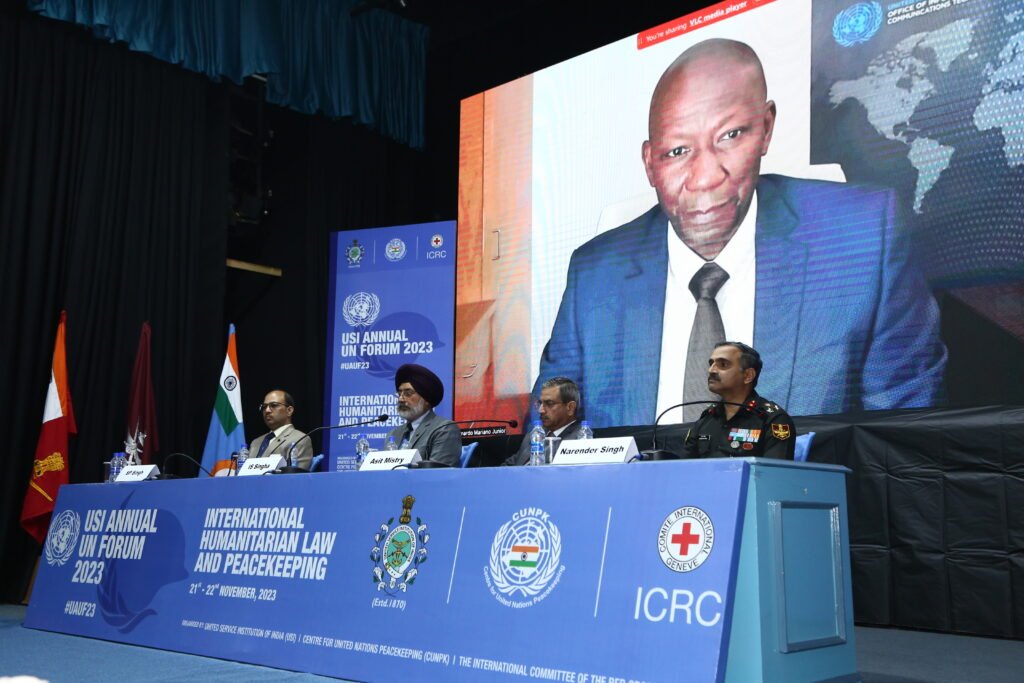
Image credits: USI
While tools like Situational Awareness systems are valuable, he identified civilian data-sharing challenges, routine decision-making gaps, lack of formal intelligence apparatus, and limited predictive analysis for the Protection of Civilian events.
Recommendations included increased investment in early warning systems, local participation per host governments, expanded drone use, budget allocation, and integrating AI for predictive analysis. He concluded by raising the critical question of potentially shifting towards more covert intelligence given the rising peacekeeper casualties in complex missions.
Closing Session
The two-day USI Annual UN Forum on International Humanitarian Law and Peacekeeping concluded with closing remarks from Lt Gen MAJ Fernandez, Director General of Staff Duties, Integrated Headquarters (Army), MoD.

The USI Annual UN Forum 2023 was an important milestone in informing discourse on IHL integration in modern peacekeeping. The seminar facilitated crucially needed dialogues between global experts on addressing ethical, operational and legal dilemmas around protecting civilians while managing threats faced by peacekeeping personnel.
Such multilateral platforms enable consolidating experiences from the field, updating capacities on developments like asymmetric warfare and recalibrating preparedness frameworks – contributing to more secure and sustainable peacebuilding pathways.
Report compiled and edited by Anamitra Banerjee, Pathanaboina Ramakrishna, Stuti Gogoi, Neha Singh Dayma & Amit Sinha.


